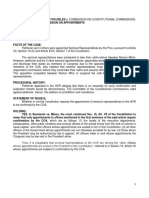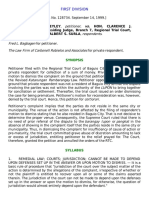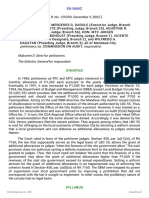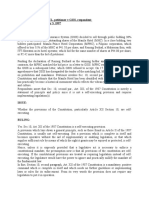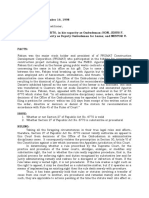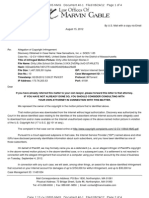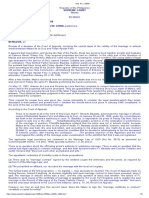Blaquera Vs Alcala
Blaquera Vs Alcala
Uploaded by
Rochedale ColasiCopyright:
Available Formats
Blaquera Vs Alcala
Blaquera Vs Alcala
Uploaded by
Rochedale ColasiOriginal Title
Copyright
Available Formats
Share this document
Did you find this document useful?
Is this content inappropriate?
Copyright:
Available Formats
Blaquera Vs Alcala
Blaquera Vs Alcala
Uploaded by
Rochedale ColasiCopyright:
Available Formats
BLAQUERA VS. ALCALA G.R. NO.
109406, SEPTEMBER 11, 1998
FACTS: On Feb. 21, 1992, then Pres. Aquino issued AO 268 which granted each official and
employee of the government the productivity incentive benefits in a maximum amount
equivalent to 30% of the employee’s one month basic salary but which amount not be less than
P2, 000.00. Said AO provided that the productivity incentive benefits shall be granted only for
the year 1991. Accordingly, all heads of agencies, including government boards of government-
owned or controlled corporations and financial institutions, are strictly prohibited from granting
productivity incentive benefits for the year 1992 and future years pending the result of a
comprehensive study being undertaken by the Office of the Pres.
The petitioners, who are officials and employees of several government departments and
agencies, were paid incentive benefits for the year 1992. Then, on Jan. 19, 1993, then Pres.
Ramos issued AO 29 authorizing the grant of productivity incentive benefits for the year 1992 in
the maximum amount of P1,000.00 and reiterating the prohibition under Sec. 7 of AO 268,
enjoining the grant of productivity incentive benefits without prior approval of the President.
Sec. 4 of AO 29 directed all departments, offices and agencies which authorized payment of
productivity incentive bonus for the year 1992 in excess of P1, 000.00 to immediately cause the
refund of the excess. In compliance therewith, the heads of the departments or agencies of the
government concerned caused the deduction from petitioners’ salaries or allowances of the
amounts needed to cover the alleged overpayments.
ISSUE: Whether or not AO 29 and AO 268 were issued in the valid exercise of presidential
control over the executive departments
HELD: The Pres. is the head of the government. Governmental power and authority are
exercised and implemented through him. His power includes the control of executive
departments as provided under Sec. 17, Art. VII of the Constitution.
Control means the power of an officer to alter or modify or set aside what a subordinate officer
had done in the performance of his duties and to substitute the judgment of the former for that of
the latter. The Pres. can, by virtue of his power of control, review, modify, alter or nullify any
action or decision of his subordinate in the executive departments, bureau or offices under him.
When the Pres. issued AO 29 limiting the amount of incentive benefits, enjoining heads of
government agencies from granting incentive benefits without approval from him and directing
the refund of the excess over the prescribed amount, the Pres. was just exercising his power of
control over executive departments.
The Pres. issued subject AOs to regulate the grant of productivity incentive benefits and to
prevent discontent, dissatisfaction and demoralization among government personnel by
committing limited resources of government for the equal payment of incentives and awards.
The Pres. was only exercising his power of control by modifying the acts of the heads of the
government agencies who granted incentive benefits to their employees without appropriate
clearance from the Office of the Pres., thereby resulting in the uneven distribution of government
resources.
The President’s duty to execute the law is of constitutional origin. So, too, is his control of
executive departments.
You might also like
- Narazi PetitionDocument6 pagesNarazi PetitionNIRUPAM DEWANJINo ratings yet
- People Vs Mabug-AtDocument2 pagesPeople Vs Mabug-AtRochedale Colasi100% (2)
- 003 - Digest Blaquera v. Alcala, G.R. 109406, September 11, 1998Document2 pages003 - Digest Blaquera v. Alcala, G.R. 109406, September 11, 1998jeffreyNo ratings yet
- Blaquera v. Alcala, G.R. No. 109406, September 11, 1998Document1 pageBlaquera v. Alcala, G.R. No. 109406, September 11, 1998Vin LacsieNo ratings yet
- Blaquera Vs AlcalaDocument3 pagesBlaquera Vs AlcalaArmie MedinaNo ratings yet
- 40 MMDA v. Bel-Air Village Association, Inc.Document5 pages40 MMDA v. Bel-Air Village Association, Inc.clarkorjaloNo ratings yet
- BENIGNO AQUINO III vs. COMELECDocument1 pageBENIGNO AQUINO III vs. COMELECTamara Claudette BautistaNo ratings yet
- Case Digest Set 6 - Executive BranchDocument15 pagesCase Digest Set 6 - Executive BranchJosephine BrackenNo ratings yet
- Part 1 - (8) Funa vs. Duque IIIDocument3 pagesPart 1 - (8) Funa vs. Duque IIIMarilou AgustinNo ratings yet
- 23 Quintos-Deles v. CADocument1 page23 Quintos-Deles v. CANMNGNo ratings yet
- H. 45 Lagman Vs MedialdeaDocument4 pagesH. 45 Lagman Vs MedialdeaPatricia BautistaNo ratings yet
- Ang-Angco v. Castillo 9 Scra 619 1963Document2 pagesAng-Angco v. Castillo 9 Scra 619 1963Rodeo Roy Seriña DagohoyNo ratings yet
- Dela Cruz Vs COA and Funa vs. Agra Case DigestsDocument3 pagesDela Cruz Vs COA and Funa vs. Agra Case DigestsGuinevere RaymundoNo ratings yet
- Bermudez vs. TorresDocument2 pagesBermudez vs. TorresSyd Geemson ParrenasNo ratings yet
- Election DigestDocument28 pagesElection DigestJoanna MarinNo ratings yet
- Judge Caoibes JR V OmbudsmanDocument2 pagesJudge Caoibes JR V OmbudsmanRichard BakerNo ratings yet
- Lansang vs. Court of AppealsDocument2 pagesLansang vs. Court of AppealsKrisha PajarilloNo ratings yet
- Boleyley V VillanuevaDocument6 pagesBoleyley V Villanuevayasuren2No ratings yet
- Pamantasan NG Lungsod NG Maynila VsDocument1 pagePamantasan NG Lungsod NG Maynila VsSapphireNo ratings yet
- Pimentel Vs JointDocument3 pagesPimentel Vs JointcyhaaangelaaaNo ratings yet
- Garcia Vs Comelec 1993Document6 pagesGarcia Vs Comelec 1993'Ann AsidNo ratings yet
- Gatchalian Vs OmbudsmanDocument8 pagesGatchalian Vs OmbudsmanMarion Yves MosonesNo ratings yet
- Aldaba V ComelecDocument2 pagesAldaba V ComelecPrinCs Muti100% (1)
- 002 Garcia-Padilla Vs EnrileDocument3 pages002 Garcia-Padilla Vs EnrileCarissa CruzNo ratings yet
- Angara vs. Electoral CommissionDocument2 pagesAngara vs. Electoral CommissionjeyNo ratings yet
- G.R. No. L-20213 Mariano Garcia Vs Chief of StaffDocument2 pagesG.R. No. L-20213 Mariano Garcia Vs Chief of StaffPamela DeniseNo ratings yet
- Topic Author Case Title GR NoDocument3 pagesTopic Author Case Title GR NoLoreen DanaoNo ratings yet
- SPARK v. Quezon City August 8, 2017 G.R. No. 225442Document3 pagesSPARK v. Quezon City August 8, 2017 G.R. No. 225442Charlyn SabioNo ratings yet
- Rufino Vs Endriga G.R. No. 139554, July 21, 2006Document2 pagesRufino Vs Endriga G.R. No. 139554, July 21, 2006WrenNo ratings yet
- in RE Appointments Dated March 30, 1998 of Hon. M.A. Valenzuela and Hon. P.B. Villarta As RTC Judges 298 SCRA 408Document1 pagein RE Appointments Dated March 30, 1998 of Hon. M.A. Valenzuela and Hon. P.B. Villarta As RTC Judges 298 SCRA 408Maan LaspinasNo ratings yet
- Abas Kida Vs Senate of The Philippines, GR No. 196271 October 18, 2011Document1 pageAbas Kida Vs Senate of The Philippines, GR No. 196271 October 18, 2011jamsdomatoNo ratings yet
- Rufino Vs EndrigaDocument10 pagesRufino Vs EndrigaDumaganNo ratings yet
- D. People vs. Jaloslos, G.R. No. 132875, February 03, 2000Document2 pagesD. People vs. Jaloslos, G.R. No. 132875, February 03, 2000MirafelNo ratings yet
- Noblejas Vs TeehankeeDocument1 pageNoblejas Vs TeehankeeAlgen S. GomezNo ratings yet
- Benigno Aquino III vs. Commission On Elections: G.R. No. 189793, April 7, 2010Document1 pageBenigno Aquino III vs. Commission On Elections: G.R. No. 189793, April 7, 2010Ma Gabriellen Quijada-TabuñagNo ratings yet
- Vital-Gozon vs. CADocument2 pagesVital-Gozon vs. CAYanilyAnnVldz100% (3)
- Apcd Vs Pca (1998)Document3 pagesApcd Vs Pca (1998)John Lester Tan100% (1)
- RBG Case Doctrines Delegation of PowersDocument7 pagesRBG Case Doctrines Delegation of Powerspoppy2890No ratings yet
- Mendoza v. CFIDocument2 pagesMendoza v. CFIAndrea JuarezNo ratings yet
- Marcos v. ManglapusDocument3 pagesMarcos v. Manglapusa_vlaureNo ratings yet
- Manalo v. Sistoza, G.R. 107369, August 11, 1999Document8 pagesManalo v. Sistoza, G.R. 107369, August 11, 1999Reginald Dwight Florido100% (1)
- Philconsa Vs Enriquez: FactsDocument2 pagesPhilconsa Vs Enriquez: FactsvictorNo ratings yet
- AC Ransom Labor Union vs. NLRCDocument2 pagesAC Ransom Labor Union vs. NLRCR.E.D. DocenaNo ratings yet
- Alajar Vs AlbaDocument2 pagesAlajar Vs AlbaRyan MostarNo ratings yet
- Administrative Law Belongs To The Field of Public Law. It Embraces AllDocument23 pagesAdministrative Law Belongs To The Field of Public Law. It Embraces AllJeg GonzalesNo ratings yet
- Quinagoran V CA. GR 155179. Aug 24 2007Document2 pagesQuinagoran V CA. GR 155179. Aug 24 2007Raymond Adrian Padilla ParanNo ratings yet
- Tupas V. Nha GR No L-49677 May 4 1989: (9) B. Civil Service Commission Section 2Document2 pagesTupas V. Nha GR No L-49677 May 4 1989: (9) B. Civil Service Commission Section 2Gin FernandezNo ratings yet
- Dadole v. Commission On Audit G.R. No. 125350. December 3, 2002.Document13 pagesDadole v. Commission On Audit G.R. No. 125350. December 3, 2002.Jim M. MagadanNo ratings yet
- 010 - Mayor Pablo Magtajas v. Pryce PropertiesDocument2 pages010 - Mayor Pablo Magtajas v. Pryce PropertiesTrixee IbañezNo ratings yet
- Delegation of Power People Vs VeraDocument2 pagesDelegation of Power People Vs VeraRuss TuazonNo ratings yet
- de Jesus vs. CSCDocument2 pagesde Jesus vs. CSCGia DimayugaNo ratings yet
- Luzon Surety v. de GarciaDocument6 pagesLuzon Surety v. de GarciaJoey YusingcoNo ratings yet
- Tawang Multi-Purpose Cooperative v. La Trinidad Water District, G.R. No. 166471, March 22, 2011Document3 pagesTawang Multi-Purpose Cooperative v. La Trinidad Water District, G.R. No. 166471, March 22, 2011Gab Estiada100% (1)
- Banda V Ermita DigestDocument1 pageBanda V Ermita DigestMizelle AloNo ratings yet
- NATIONAL FEDERATION OF LABOR v. BIENVENIDO E. LAGUESMADocument16 pagesNATIONAL FEDERATION OF LABOR v. BIENVENIDO E. LAGUESMAIldefonso HernaezNo ratings yet
- PLANAS v1Document1 pagePLANAS v1Olive CachaperoNo ratings yet
- Lopez vs. Senate (G.R. No. 163556, June 8, 2004)Document11 pagesLopez vs. Senate (G.R. No. 163556, June 8, 2004)Jaime Pinugu100% (1)
- ARTURO M. DE CASTRO vs. JUDICIAL AND BAR COUNCIL (JBC) and PRESIDENT GLORIA MACAPAGAL - ARROYO, G.R. No. 191002, March 17, 2010, J. BERSAMINDocument1 pageARTURO M. DE CASTRO vs. JUDICIAL AND BAR COUNCIL (JBC) and PRESIDENT GLORIA MACAPAGAL - ARROYO, G.R. No. 191002, March 17, 2010, J. BERSAMINAntonio Reyes IVNo ratings yet
- De Castro Vs JBCDocument1 pageDe Castro Vs JBCwesleybooksNo ratings yet
- Lim vs. People of The Philippines, 340 SCRA 497Document5 pagesLim vs. People of The Philippines, 340 SCRA 497Chanyeol ParkNo ratings yet
- Blaquera, Et Al. v. Alcala, 295 SCRA 366 (1998) PDFDocument2 pagesBlaquera, Et Al. v. Alcala, 295 SCRA 366 (1998) PDFArvhie SantosNo ratings yet
- Digest Blaquera V AlcalaDocument2 pagesDigest Blaquera V AlcalaZarah Jeanine100% (1)
- People vs. ReyesDocument1 pagePeople vs. ReyesRochedale ColasiNo ratings yet
- Manila Prince Hotel vs. GsisDocument1 pageManila Prince Hotel vs. GsisRochedale ColasiNo ratings yet
- Tañada VS CuencoDocument1 pageTañada VS CuencoRochedale ColasiNo ratings yet
- Case Digest: Clu Vs Executive Secretary G.R. No. 83815 FactsDocument1 pageCase Digest: Clu Vs Executive Secretary G.R. No. 83815 FactsRochedale ColasiNo ratings yet
- 8.people vs. Domingo UralDocument2 pages8.people vs. Domingo UralRochedale ColasiNo ratings yet
- People vs. OanisDocument2 pagesPeople vs. OanisRochedale ColasiNo ratings yet
- People v. Ortega 1997Document2 pagesPeople v. Ortega 1997Rochedale ColasiNo ratings yet
- Javellana vs. DILGDocument2 pagesJavellana vs. DILGRochedale Colasi100% (1)
- Garcia vs. Board of InvestmentsDocument2 pagesGarcia vs. Board of InvestmentsRochedale ColasiNo ratings yet
- People v. RenegadoDocument2 pagesPeople v. RenegadoRochedale ColasiNo ratings yet
- Ceby Oxygen & Acetylene Co., Inc. vs. Sec. DrilonDocument2 pagesCeby Oxygen & Acetylene Co., Inc. vs. Sec. DrilonRochedale ColasiNo ratings yet
- FUNA vs. VillarDocument4 pagesFUNA vs. VillarRochedale ColasiNo ratings yet
- Dimaporo vs. Mitra Jr.Document3 pagesDimaporo vs. Mitra Jr.Rochedale ColasiNo ratings yet
- Fabian vs. DesiertoDocument2 pagesFabian vs. DesiertoRochedale Colasi100% (1)
- Drilon vs. LimDocument3 pagesDrilon vs. LimRochedale ColasiNo ratings yet
- Jack H. Londono v. City of Gainesville, A Political Subdivision of The State of Florida, 768 F.2d 1223, 11th Cir. (1985)Document8 pagesJack H. Londono v. City of Gainesville, A Political Subdivision of The State of Florida, 768 F.2d 1223, 11th Cir. (1985)Scribd Government DocsNo ratings yet
- Institution of SuitDocument10 pagesInstitution of Suitrnithiyaa50% (2)
- Bello VS CaDocument1 pageBello VS CaJanice Santiago100% (1)
- Torts and Damages1Document25 pagesTorts and Damages1Rvic Civr0% (1)
- 3C Laurel PT 1Document13 pages3C Laurel PT 1John Paulo Genesis AquinoNo ratings yet
- Minor Works Agreement: Contract Data: Click Here To Save This Document On-LineDocument13 pagesMinor Works Agreement: Contract Data: Click Here To Save This Document On-Linesenzo tembe100% (1)
- 1.4 Processes of Transferring oDocument8 pages1.4 Processes of Transferring oMujahid RuduwanNo ratings yet
- 40 1Document4 pages40 1J DoeNo ratings yet
- Dhaka International UniversityDocument8 pagesDhaka International UniversityJehan MahmudNo ratings yet
- Remrev Cases - FinalsDocument195 pagesRemrev Cases - FinalsokijnNo ratings yet
- United States Court of Appeals, Second Circuit.: No. 1268, Docket 88-5006Document5 pagesUnited States Court of Appeals, Second Circuit.: No. 1268, Docket 88-5006Scribd Government DocsNo ratings yet
- Schuman v. Greenbelt Homes - Record Extract Volume 3 of 4Document524 pagesSchuman v. Greenbelt Homes - Record Extract Volume 3 of 4J.P. SzymkowiczNo ratings yet
- 25 Individuals Indicted in Multi-Million Dollar Illegal Nationwide Sports Betting RingDocument7 pages25 Individuals Indicted in Multi-Million Dollar Illegal Nationwide Sports Betting Ringpokernews0% (1)
- Alec Baldwin Probable Cause StatementDocument10 pagesAlec Baldwin Probable Cause StatementLaw of Self Defense100% (1)
- Expungements, Early Termination, and Felony ReducDocument6 pagesExpungements, Early Termination, and Felony Reducgeri delaneyNo ratings yet
- Prescrition in Action For ReconveyanceDocument7 pagesPrescrition in Action For ReconveyanceMärinël VëlmöntëNo ratings yet
- UST Golden Notes - Administrative LawDocument11 pagesUST Golden Notes - Administrative LawTammy Yah100% (4)
- The Labor Code of The Philippines: By: Lysander R. Bague R.NDocument15 pagesThe Labor Code of The Philippines: By: Lysander R. Bague R.NlkristinNo ratings yet
- Tree Planting Community Service Fieldtrip Permission Form - Feb. 17, 2024Document1 pageTree Planting Community Service Fieldtrip Permission Form - Feb. 17, 2024messigoat2234No ratings yet
- Page 3Document230 pagesPage 3Pat RañolaNo ratings yet
- PCGG VS SANDIGANBAYAN GR No 90478 1991-11-21Document14 pagesPCGG VS SANDIGANBAYAN GR No 90478 1991-11-21WazzupNo ratings yet
- G.R. No. 141524 Neypes Vs CADocument8 pagesG.R. No. 141524 Neypes Vs CAChase DaclanNo ratings yet
- Chanchal PanchalDocument4 pagesChanchal PanchalAazad JiiNo ratings yet
- Pandurang V State of Hyderabad CRIMINAL ConspiracyDocument10 pagesPandurang V State of Hyderabad CRIMINAL ConspiracyShruti SinghNo ratings yet
- Southern Cross Cement vs. Cement Manufacturers, GR 158540Document2 pagesSouthern Cross Cement vs. Cement Manufacturers, GR 158540Gwen Alistaer CanaleNo ratings yet
- Buy The HouseDocument9 pagesBuy The HouseAnthony Juice Gaston Bey100% (4)
- 14 Loria VS FelixDocument2 pages14 Loria VS FelixÇhøAÿaÇhānNo ratings yet
- Paragas Vs Cruz LegalprofDocument2 pagesParagas Vs Cruz LegalprofjoannecatimbangNo ratings yet
- (2023) SCGA 30 (Revised)Document50 pages(2023) SCGA 30 (Revised)dpoet1No ratings yet









